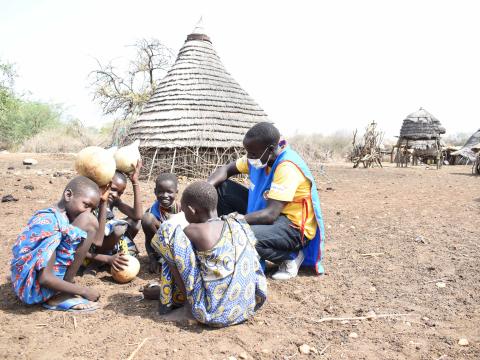Hidden Hero: The tireless community health worker

Raising awareness about the importance of immunization and proper management of preventable diseases helps ensure a healthier future for mothers and children in remote counties in South Sudan, thanks to community health workers like Lino who are bent on serving his community despite numerous challenges they face.
It is noon, and Lino has been walking for two hours in the sweltering South Sudanese sun to get to his next appointment.
“It is challenging work, but I am more than happy to do it," explains a tired but enthusiastic Lino.
Lino Lolepiet, a 40-year-old father of 12, is a Home Health Promoter working with World Vision. He is among the 457 Home Health Promoters working in the 24 counties in Greater Equatoria States under the CORE Group Partners Project and based in Kapoeta South County of Eastern Equatoria.

Lino was selected by his community and seconded by the County Health Department to work for the Organization for Peoples Empowerment and Needs, World Vision's implementing partner for Eastern Equatoria State.
His work in Namojongoronyit village, where he lives, started in July 2020.
“I received training in disease surveillance – this involves searching, detecting, and reporting of suspected cases of polio, measles, yellow fever, Ebola Virus Disease adverse events following immunization, and COVID-19,” he says.
During training, he learnt the channels of reporting in referral pathways, awareness creation mobilization during campaigns about COVID-19 vaccinations and routine immunizations to protect and save the lives of children and people in his community.
Where Lino comes from, most people are illiterate and do not know the common diseases afflicting them. This situation motivates him to serve them.
“Many children used to die in the community because mothers trusted the herbalists and traditional doctors more than the medicines from the health facilities but this has changed now,” Lino says.
He adds, “We had a mother who lost two of her children in the span of two days due to measles. This experience forced me to become an advocate in the community. It’s after this tragedy that mothers started confiding and revealing to me that some of their children could have died from this preventable disease because they chose to take them to the herbalists and not the hospitals.”
The project gave Lino a bicycle to facilitate his transport to the communities and homes during his house-to-house visits and other activities. Still, the thorns that puncture the tires of his bicycle and the bad roads that are inaccessible due to heavy rains challenge his work.
Lino's passion for his work surpasses the numerous challenges he faces.
"When my bicycle is broken, I still do my work, sometimes walking for hours to have a review meeting with 10 community key informants I supervise,” he shares.
During one of his visits to supervise a community key informant within Namojongoronyit, heavy rain hindered his journey back to his family. He decided to seek refuge in the chief’s home due to fear of wild animals in the bush.

Apart from illiteracy, his village has limited access to clean water. The women, men, and children fetch water in the night or early morning from the Singaita River during the dry season.
He says, “I talk about the importance of clean water and sanitation practices. At the same time, I also provide information to people about immunization and how it helps prevent sickness.”
The trust between the mothers and Lino is evident, as he has saved the lives of many children from polio, measles, yellow fever, and other diseases through his work. He continues to advocate for the immunization of children from vaccine-preventable diseases to ensure a healthier future for mothers and children.
Story and photos by Jemima Tumalu, Communications Officer